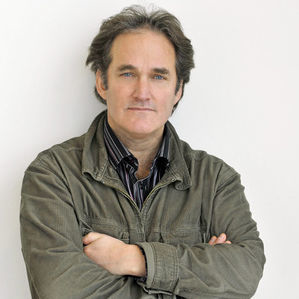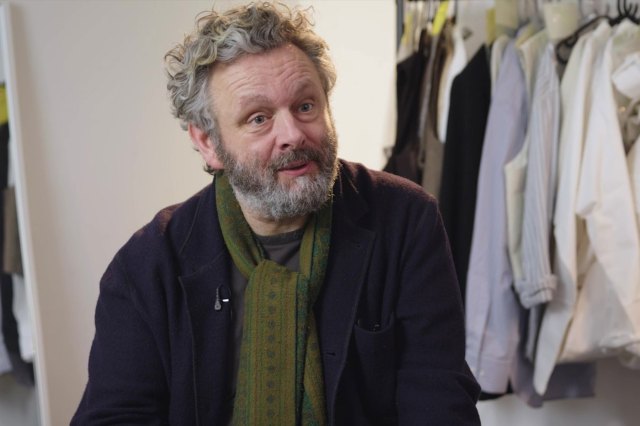Jonathan Maitland: 'I want to give Jimmy Savile the trial he never had'
The man behind ”An Audience with Jimmy Savile” at the Park Theatre tells us what he hopes the play, which premieres on Thursday, will achieve
Jonathan Maitland, a former presenter of BBC shows including the Today programme and Watchdog, has recently found his calling as a playwright. His debut Dead Sheep, about the fall out of Geoffrey Howe and Margaret Thatcher, broke the Park Theatre's box office record, and his follow up has caused controversy for putting disgraced former TV presenter Jimmy Savile – played by Alistair McGowan – in the dramatic spotlight.

Why did you want to write a play about Jimmy Savile?
Because I think it's an incredibly important story that needs to be told. My first instinct was to tell it journalistically, which is what I've been doing for 30 years, but it's been increasingly obvious to me over the past few years, and certainly since doing Dead Sheep, that drama can shine a more revealing light and get to the hidden truths more effectively. And I can't think of a more compelling or important subject. I had no doubt from the moment I thought of it that it was 100% the right thing to do.
There must have been at least a small voice of doubt in your head that it's too soon since the revelations came to light, or that it's in poor taste?
There's no flag that goes up and says 'now is the right time'. You have to be guided by the people whose opinions matter the most – the victims and survivors. For them, the timing issue is that their stories weren't told sooner, so we're telling the story too late, not too soon. And as for questions of taste, if you'd said to me that a musical about the victims of the Ipswich lorry driver would be good taste, not long after it happened, I would've thought you were having a laugh. You can't dismiss something just because it's been embarked on. My boss at the BBC used to say 'there are no taboo subjects, only taboo treatments'. If this was a comedy or a musical I probably would've been run out of town. But it isn't. It's a serious dramatised attempt to ask the question that everybody still asks – how on earth did he get away with it?
Do you think the casting of Alistair McGowan as Savile led people to assume it is a comedy?
I understand why people might think that, but the casting is inspired because it reflects the Savile story perfectly. Savile was someone who came from light entertainment, and the shocking truth was that he was a monster. So what a very good idea to get someone who comes from a light entertainment background to play him. I think it can be more compelling for audiences to have their expectations of an actor confounded. Alistair's a terrific stage actor and it makes perfect sense to cast him in this role… The uncomfortable truth is that [Savile] was charismatic, funny and eccentric, which is why he got to do what he did. So it's a dereliction of dramatic duty not to give a sense of that.
And you spoke so several victims?
I've had direct communication with six of Savile's victims, and I've also communicated with more than 170 via their lawyer, Liz Dux, who represents the largest group of them. I've also spoken directly with a further dozen victims of sexual abuse and to half a dozen experts, including counselors, charity workers and child psychiatrists. So my research was very thorough.*
Have you come across any new revelations?
Nothing. This isn't that kind of piece. It's an attempt to do what drama should do, which is reach the parts that journalism can't. But more importantly, and optimistically, it's not actually about Savile, it's about the heroine, called Lucy, and how some of his victims have managed to come back from lives of trauma and abuse and lead meaningful, happy, functioning lives. I thought it was important to give the audience something to go home with that was positive. So he's not the main character in that sense.
Talk us through the format – is it related at all to the ITV show An Audience With…?
It's not based on that show as such. The audience refers to the audience that the victim has with Savile at the end when she confronts him, as well as us as the audience and our complicity in his crimes. The format is of a This is Your Life-style show, where the great and the good including Prince Charles and Margaret Thatcher line up to praise him. So that's one thread, the other centres on the efforts of Lucy, a woman who was abused by him, to be believed at every level of society, from her own house to the police, the media and finally to Savile himself.
Did you ever encounter him during your time at the BBC?
No. But like many BBC journalists who worked there I thought I was a fearless seeker of the truth, and all the time this was happening right under our noses. It beggars belief, but we all missed the story. People talk about having heard rumours, but I never did. The fascinating thing about this story is how an entire institution could be hoodwinked by one man. He didn't have a family himself, so he would inveigle his way into big institutions – the BBC, the NHS, the church – and they'd become like surrogate families. And what do families do? They protect their own. I think that's endlessly fascinating.
Do you think behaviour of that sort still goes on?
I can't believe that a celebrity of his stature would even begin to get away with it now. Does it happen in closed, male-dominated, hierarchical institutions? Absolutely… I think it goes on a lot in institutions that haven't had a revealing light shone on them.
What do you hope the play achieves?
Like anyone who writes a play, I'm trying to make people think, trying to hold a mirror up to human existence, trying to stimulate debate. Crucially in Savile's case the one thing people still don't understand is how he got away with it. I hope that people will leave the play thinking 'now I understand' – that's what I'm hoping to achieve. I also want to put him on trial, to give him the trial he never had in his lifetime.
You came late to playwriting – why now?
I've always dreamt of doing it, ever since school. But for various reasons I decided early on that the entertainment business wasn't for me. However, everything I've done in my professional life as a journalist and broadcaster has led me to this… A week into Dead Sheep I thought 'I can do this'. It's been wonderful and life changing. I've long wanted to call myself a playwright, and I think I can now.
An Audience with Jimmy Savile is at the Park Theatre from 10 June to 11 July 2015
*This answer has been edited since the interview was published due to a request by Jonathan Maitland













